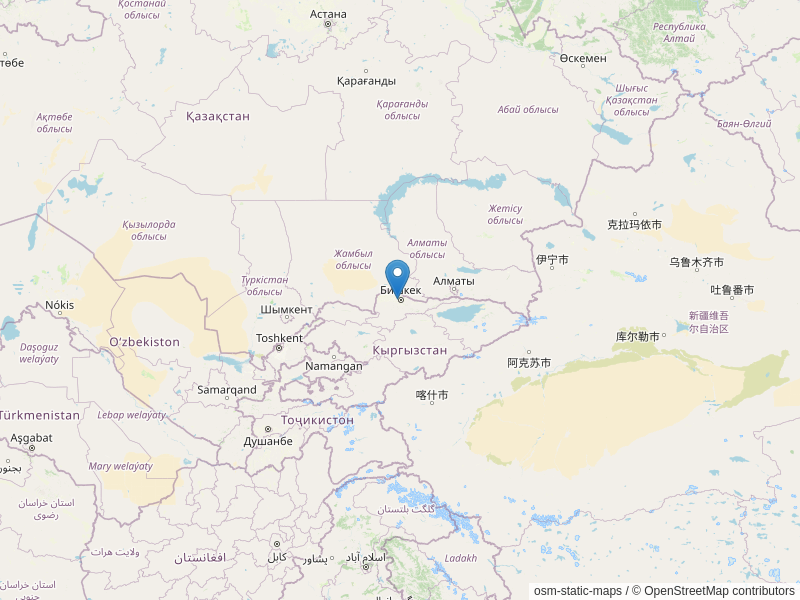FAQs

If you still have unanswered questions, please contact us by email. infodaad-kyrgyzstan.org
Due to the changed conditions caused by the corona pandemic, the following language certificate regulations apply on a one-off basis for autumn 2020:
- Summer Language Course: You are required to submit a language certificate which confirms that you have at least a German language level at A2. This certificate can be an onSET test (not older than two years) or a language certificate from the Sprachlernzentrum in Bishkek (Goethe-Zertifikat). If you do not have a language certificate, please contact us by e-mail before 15th November 2020 (infodaad-kyrgyzstan.org) with the following information: your name, your university, your degree programme, which academic year you are studying right now, your e-mail address, your mobile phone number. We will then arrange a Skype appointment with you and test your German in a standardised interview.
LINK - Scholarships for Master Studies:
English: You will be required to provide a certificate that proves that your language skills correspond to the level required in the three courses of study you have chosen. All official language certificates (IELTS, TOEFL, etc.) are valid. For scholarship applications we also accept the Institutional TOEFL, which is offered twice a week by the American University of Central Asia (AUCA). Please contact the AUCA to find out about the dates.
LINK
German: When applying for a degree programme, which is offered in German language, you need at least level B1 at the time of the scholarship application and also the level required by the programme when applying at German universities (spring 2021). If necessary, the DAAD will finance a language course for you before starting your studies.
Due to contact restrictions, we are not able to take an onSET test this year to assess your German language skills. Please assess your language level yourself. Assessment Test by Goethe-Institut
LINK
- What is the difference between a university of applied sciences (FH or HAW) and a university?
Degree programmes at universities of applied sciences have a practical orientation and primarily teach skills in line with the intended vocation. Research at universities of applied sciences is mainly practice-related. Universities of applied sciences work closely with businesses in the region and work placements are mandatory for students. However, most universities of applied sciences do not currently confer doctorates. If you would like to complete a doctorate at a university of applied sciences, please make sure to enquire very carefully beforehand whether this is possible. - What is the difference between a private and a public higher education institution?
Public and private higher education institutions differ not so much in the quality of their teaching, but rather in their funding. Students at private higher education institutions usually have to pay significant sums in tuition fees, while studying at public higher education institutions is free. When selecting a higher education institution, please make sure to take note of any tuition fees.
- How much does studying in Germany cost?
Studying at public higher education institutions is free; you will however be required to pay what is known as a “semester contribution” that amounts to around 250 EUR per semester. This contribution includes the cost of using the library and a semester ticket for public transport. Please note that public higher education institutions in Baden-Württemberg require non-EU citizens to pay a tuition fee of 1,500 EUR per semester. - How high is the cost of living in Germany?
In cities such as Munich or Hamburg, rent alone is already far higher than in smaller cities. It is therefore important that you research rent prices before beginning your programme. Broadly speaking, you can assume that accommodation, food, clothing and transport will come to around 850 EUR per month. - Can students work in Germany?
Yes. If you are studying in Germany, you may work for up to 120 days a year.
- Does the DAAD also award scholarships for Bachelor’s degree programmes?
No. But if you are studying for a Bachelor’s degree, you can apply for a scholarship for a university summer course. To qualify, you must speak German at A2 level at least. For more information please visit our scholarship database. - Can I enrol at a German higher education institution immediately after completing secondary school?
No, that is not possible. You have to either first enrol onto a preparatory course in Germany; you may then take the university entrance examination after one year. Or you can first study a similar subject for one year at a higher education institution in Kyrgyzstan and then begin a degree programme at a German higher education institution. - What is a preparatory course?
A preparatory course serves to improve your German and offers specialist courses to prepare you for your degree programme in Germany. Preparatory courses only take students who have passed an entrance examination and already have German skills at B1 level at the time of registering. There are also preparatory courses that prepare students for English-language Bachelor programmes, but these are privately run and demand high tuition fees.
- Do I have better chances of getting a scholarship if I speak German?
No, you can apply for German-language and English-language programmes of study. - May I apply for a scholarship for a Master’s programme if I already hold a Master’s degree?
There is no general rule against this, but you will have to give very good reasons as to why you are seeking a second Master’s degree for your professional development rather than, for example, aiming to complete a PhD. - I am a Kyrgyz citizen, but I completed my degree abroad. Can I apply for a DAAD Master’s scholarship in Bishkek?
Yes, if you reside in Kyrgyzstan at the time of application. However, if you still live in the foreign country where you studied, please apply for a DAAD scholarship from there. - I am a citizen of another country, but have graduated from a Kyrgyz higher education institution. Can I apply for a DAAD scholarship in Bishkek?
Yes. - When should I ideally submit the application dossier for a scholarship?
Ideally two to three weeks before the closing date, as high data volumes can lead to application portal outages shortly before the deadline. - Am I eligible to apply for a DAAD scholarship if I am in Germany at the time of application?
Yes, if you have not been in Germany for more than 15 months at the time of application. - I am already enrolled at a German higher education institution. Am I still eligible to apply for a DAAD Master’s scholarship?
Yes. If you are currently in the first semester of a two-year Master’s programme, you can apply for a one-year DAAD Master’s scholarship. If your application is accepted, you would then receive the scholarship for the second year of your Master’s programme. Please note that if you are invited to a selection interview, you will be required to travel to Bishkek at your own expense. - Can I choose which higher education institution in Germany I want to study at?
Yes, of course. When choosing a degree programme and institution in Germany, please take care to select one with no tuition fees. The DAAD only pays a grant to cover your cost of living; any tuition fees would have to be funded entirely by you. - I would like to apply for a DAAD Master’s scholarship. Can I request additional funding for my family members?
Yes, as a scholarship holder you may apply for a family allowance. However, this only applies to study scholarships. No family allowance is provided in the ERP programme. - Am I eligible to apply for a DAAD Master’s scholarship if I am in my final year of study at the time of application?
Yes, but only if you will be able to submit your Bachelor’s certificate no later than the date on which you enrol at the German higher education institution. - I am completing a distance study programme in Kyrgyzstan. Am I eligible to apply for a DAAD Master’s scholarship?
No, that is not possible. - Which should I apply for first, a study place or a DAAD Master’s scholarship?
You have to apply for the DAAD scholarship a year before you begin your studies. The call for applications is published in August and the closing date is at the end of October of the same year. You will be informed of the outcome of your application in March of the following year. Then you can apply directly to a German higher education institution for a study place. The closing date for applying to German higher education institutions is between March and July. The exact date varies from institution to institution.
- Does the DAAD also award doctoral scholarships?
Yes, the call for applications for doctoral scholarships is published every year in August. The closing date for applications is in mid-November of the same year. - Can I complete my doctorate in English?
Yes, this is possible if your doctoral thesis supervisor agrees.
- I am planning to complete an English-language Master’s degree in Germany. Will I need German skills as well?
Not necessarily. It is sufficient that you meet the language requirements of the higher education institution of your choice. However, please note that German language skills will make your day-to-day life in Germany much easier. - What language proficiency level must I have in order to study in Germany?
Language requirements vary between degree programmes, but in general, higher education institutions expect a proficiency level of C1. - Do I have to submit an official language certificate (TestDaF, iBT, TOEFL etc.) when I apply for a DAAD scholarship?
For your application to the DAAD, you are required to submit proof of language skills indicating a proficiency level that is sufficient for the study programmes you later intend to apply to. This proof of language skills does not have to be an official certificate. For German, please take a test at the IC (please enquire beforehand!); for English we accept the Institutional TOEFL from the American University of Central Asia. However, if you are awarded a scholarship, you will have to submit an official language certificate when you enrol at the German higher education institution.










